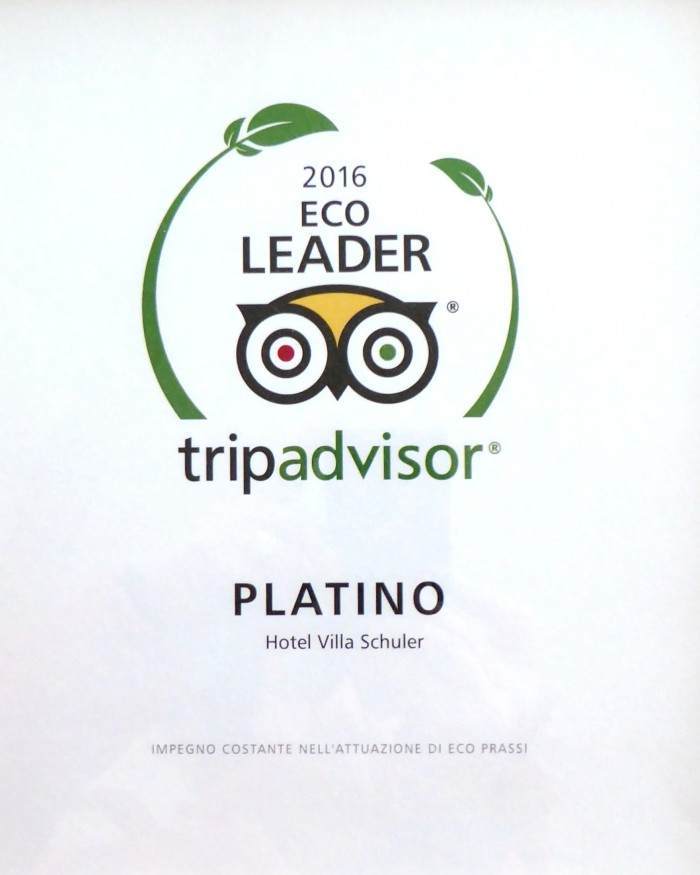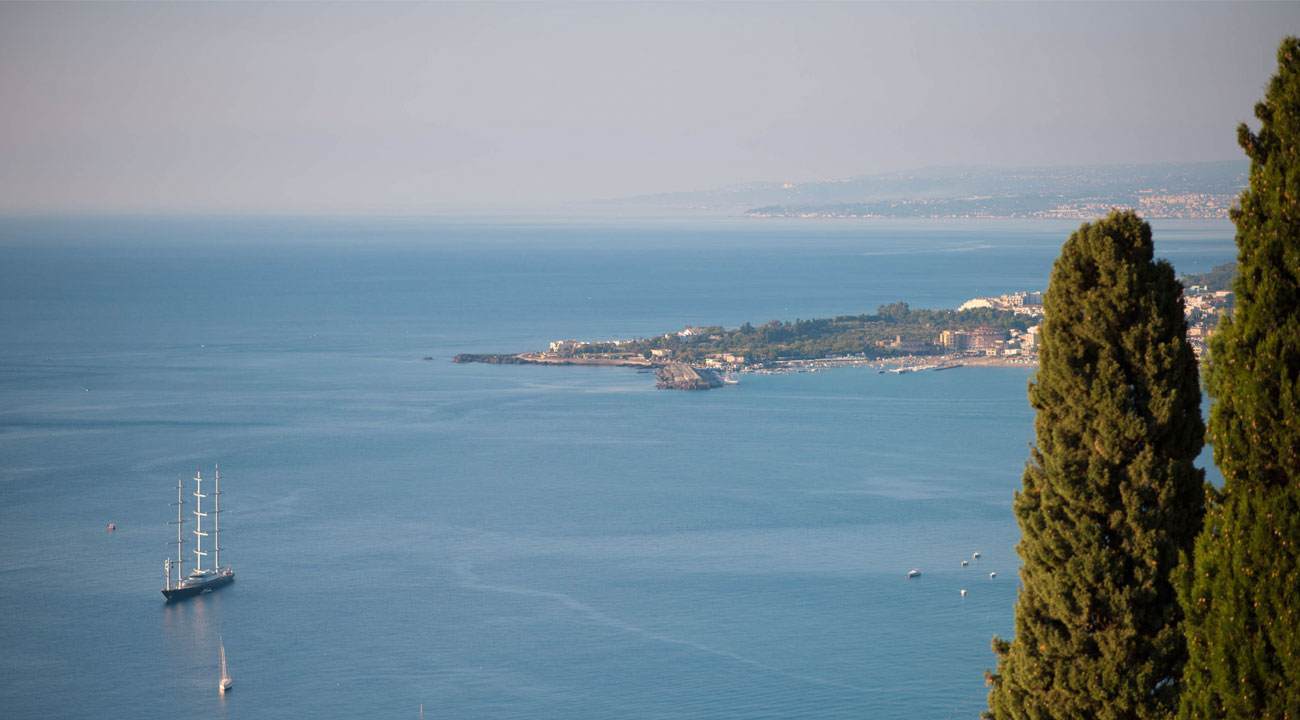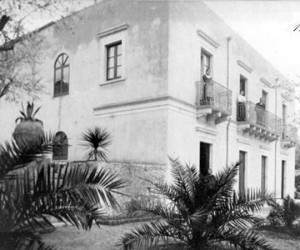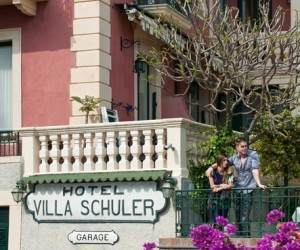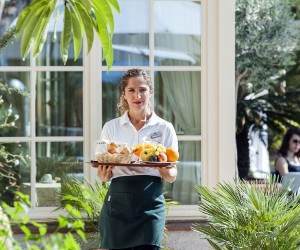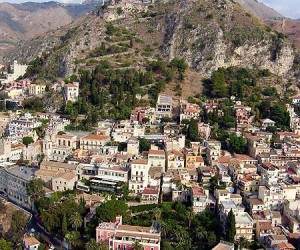当ホテルの哲学
伝統は、生きていく為に、日々革新されるべきである。
シチリアの邸宅ヴィッラ・シューラーを1894年に完璧な土地に建設することを選んだのは、祖父エウジェニオ・シューラーでした。そこはタオルミーナ旧市街の特権的なロケーションで、広大な地中海庭園に囲まれ、イオニア海沿岸とエトナ山を臨む素晴らしいパノラマが広がります。
完成してから数年後の1905年、ヴィッラ・シューラーは個人の邸宅からホテルへと変わり、それ以降シューラー家がホスピタリティーに専念しています。祖父母のアンナとエウジェニオ、エウジェニオ・ジュニア、そしてマーサ・シューラーのおかげで、今日、3代目となり、おそらく家族経営レベルのシチリアで最も「長寿」なホテルです。
歳月を経る中で、愛するヴィッラに個人邸宅の魅力を維持できるように常に努力してきました。情熱に燃えたホテル経営者として我々は、洗練された純正な豪華さや個別サービスの品質や真正に基づいた近代的なホテル業の全コンフォートによって高められたかつての伝統的なホスピタリティーに、固く結びついていると感じています。
多国語を話す当ホテルのスタッフとともに、我々はシチリアを際立たせる最も貴重な特徴と思われることに励んでいます。それは、その何千年もの歴史の中で様々な文化の「家」となってきた非常にユニークでホスピタリティー溢れる島の国際的な精神です。
ヴィッラ・シューラーの全ての者たちにとって、世界中からのお客様を「我が家」にお迎えできることは大変光栄なことであり、同時にシチリアの美、豊かな文化、自然、味覚、香り、我々はこれらの証人や使者のように感じています。
私達の目的は、この島への愛情をお客様にお伝えすることにあります。
その為に必要な条件は、自然や持続可能な観光に対する尊重の念、そしてお客様、従業員、納入業者、同僚、その他全てパートナーの人々に対する誠意です。そして、日常的に振舞う倫理標準を守るということです。
クリスティン、ジェラルド・シューラー
ISO 14001 certification 2019-2020
We are ISO 14001 certified, yearly since 2008
Our philosophy and our product are based on environmentally orientated hotel management.
The recent refurbishing of the Hotel Villa Schuler has been realized following the criteria of Building Biology:
– Using traditional building methods and choosing appropriate natural, long-lasting materials guaranteeing perfect transpiration of both the outside walls and the interior structures. The main walls are all built with natural stones thick up to two feet allowing perfect and natural heat and noise insulation. A non-roughcast layer-sample of the old walls is visible in our dining room.
– Utilizing and taking advantage of natural ventilation: the hotel is positioned high above the sea and from the valley underneath a constant airflow allows us in realizing perfect summer ventilation from the lower to the higher floors of the building guaranteeing healthy indoor air quality.
– Using transpiring watercolors, removing and avoiding all those building materials that have shown to be dangerous due to their toxic components as hazardous organic volatile compounds, plastic furniture, and synthetic materials, splinter -woods, lead, and asbestos.
– Taking care to reduce electromagnetic smog to a minimum. All major fuses-boards have been replaced and repositioned outdoors into a centralized, screened back-office. All electric wires of the entire building and the guest-rooms have been replaced and rationalized, all net circuits are screened.
The environmentally orientated hotel management includes waste-separation for recycling purposes, containers for flat batteries, energy-saving appliances, low-energy light bulbs, individually controlled air conditioning regulated by contact breakers of the double-glazed windows and balcony doors, solar energy for hot water production, reducing to a minimum the use of disposable crockery or non-returnable bottles, of canned drinks and portion packs, practicing flexible changes of bathroom towels, using ecological detergents and polishers, avoiding sealing outdoor grounds and using exclusively natural fertilizers in the gardens.
At breakfast, we gave priority to including the largest possible choice of natural foods, local products, regional specialties, and fresh food without preservatives. Some organically grown products as well.
The same importance is given to or the client’s safety.
The drinkable water is filtered, decanted, and naturally decalcified through deionization processing. All water pipes have been recently replaced with the latest non-toxic types. All electric installations are technologically advanced and corresponding to the latest security norms. All single circuits are protected by life-saving devices. Alarm calling devices in each bathroom. Fire danger is reduced to a very minimum thanks to the virtual non-existence of dangerous materials like plastics and synthetics, carpets, and tapestries. Curtains and mattresses are fire-resistant. A total of 80 smoke detectors not only in the 26 guest rooms. The building is subdivided into fireproofed compartments and specialized technicians constantly carry through the security checks to devices and machines. In winter 2004-2005, we replaced all diesel heaters with the last generation of cleaner gas-heaters with heat recovery systems integrating it to the existing solar heaters. The results were astonishingly positive, both for the economic advantages as well as far as the much lower emissions are concerned.
Since 2007 we chose to submit our Hotel Villa Schuler to ISO 14001 because it is the best-known, strictest, most reliable, and internationally accepted specification for an environmental management system (EMS). It specifies requirements for establishing an environmental policy, determining environmental aspects and impacts of products/activities/services, planning environmental objectives and measurable targets, implementation and operation of programs to meet objectives and targets, checking and corrective action, and management review.
It helps our hotel management to minimize how our operations negatively affect the environment (cause adverse changes to air, water, or land), comply with applicable laws, regulations, and other environmentally oriented requirements, so our hotel will continually improve on the above criteria.
ISO 14001 is similar to ISO 9000 quality management in that both pertain to the process (the comprehensive outcome of how a product is produced) rather than to the product itself. The overall idea is to establish an organized approach to systematically reduce the impact of the environmental aspects which our hotel can control.
Hotel Villa Schuler Environmental Terms Definitions & Environmental Policy
- Allergies: an approach to take care of people with chemical sensitivities and allergies to airborne particles that also reside in carpets, drapes, and bedding. We do not use carpets and both our bedside carpets and also our curtains are made our of cotton and are washed frequently, very frequently. The issue of allowing pets is of concern here too, so we decided: no pets are allowed in our hotel
- Alternative Energy: we use renewable energy sources, such as solar systems. It excludes fossil fuels.
- Bulk Soap and Amenities: soap, shampoo, conditioner, and lotion provided from a bulk dispenser rather than in individual packages. This approach saves time and money for us and for the natural resources and landfill contributions by cutting down on the packaging.
- Compostable Disposables: sometimes the use of disposable service items can’t be avoided. In those cases, we want to give credit to disposable items, like paper napkins and corn-based plastic, that are biodegradable.
- Composting: in our garden, we practice the biological decomposition of solid organic materials by bacteria, fungi, and other organisms into a soil-like product that is used to enrich our bio-garden soil. This enrichment not only nourishes the soil but also helps increase moisture retention and thus decrease the need for additional watering.
- Cotton Towels and Linens: cotton products don’t add VOCs to the air, thus helping air quality in guestrooms where they are used. Towels and linens that are a blend of cotton and synthetic fabrics aren’t sustainable because of their reliance on petrochemicals. Organic cotton or natural linen is even better because of their non-use of petrochemicals.
- Donating to Charity: one often overlooked aspect of recycling is what to do with sheets, towels, table linens, furniture, carpeting, window coverings, appliances, bedspreads, etc that aren’t useable or useful to the property any longer. Selling or donating them to others is a great way to have the goods reused and keep the items out of the landfill.
- Durable Service Items: dishes, cups, glasses, mugs, tableware, and serving pieces that are long-lasting, not disposable.
- Eco-friendly Food Served: we have no restaurant. At our breakfast, we do offer mostly Sicilian food served “a la carte” that has been grown in a manner sensitive to its natural habitat for preserving wildlife and other plants, organically grown, raised and certified, or local and thus freshly “harvested”.
- Inform Guests About “Green”: teaching our clients looking at our website or staying here about the green actions we take and why those actions are important, as well as encouraging others to take their own green actions.
- Educating our Staff to “Green Philosophy”: constantly teaching people working at our property about the green actions the property takes, why those actions are important, why the staff needs to support the program, as well as encouraging staff to make their own green actions. This is a very important part of the ISO 14001 procedures we are submitting at the moment.
- Energy Conservation: reducing the amount of energy used, for example, through the use of energy-efficient lighting and appliances, turning off lights and appliances when not in use, and using insulation and weather stripping. This may also be referred to as energy efficiency. It is possible to dramatically reduce energy consumption for powering our homes and buildings (and cars) without major sacrifices. This lessens our dependency on non-renewable resources and reduce the costs connected with excessive energy use.
- Environmental Cleaning: approaching housekeeping and laundry from the perspective of not using harsh or harmful-to-people chemicals or cleaning styles. That includes not using perfumed or scented laundry supplies, carpet cleaners, cleaning supplies, or air fresheners.
- Fresh Air: all our guestrooms have either windows that open or are part of a fresh-air exchange system within the hotel. Fresh air is healthier than the musty, stale air of closed-up rooms.
- Hotel Recycle Bins: special containers are placed around the property so guests can put their recyclable items there, rather than in the trash. This approach can teach a hotel’s guests about the ease and benefit of recycling and makes it easier for us to sort recyclable items.
- Maintenance for Conservation: our approach to a green program means also replacing old, wasteful fixtures (light bulbs, old toilets that use lots of water in their flushing, old shower heads and faucets that allow more than 2 gallons/minutes through) and appliances (like refrigerator and freezers, ice machines, washing machines and dryers, air conditioners, furnaces/heaters, and computers) as they break or wear out, with new efficient fixtures and appliances (Eurocertifications).
- Newspaper Program: we feel that newspapers shouldn’t be delivered to every guest in the hotel because it is such a waste of paper and resources. Instead, magazines are available in common areas for free, thus saving resources and landfills.
- Non-Smoking Rooms: all our rooms and common areas are non-smoking, so our guestrooms are guaranteed to be safe from this kind of pollution.
- Organic Food Served: we prefer organic food grown without the application of pesticides or fertilizers. Plant nourishment comes from the use of compost. Pest protection comes from growing healthy plants, companion planting, and natural pest controls like beneficial insects.
- Participate in Green Programs: our hotel is involved in an ISO 14.001 certification program and also in the TUI Environmental Champion Award Program.
- Promoting “green” in our PR: this is clearly shown on our official web page, as well as in all other activities we do.
- Recyclable Disposables: we feel that foam products as cups, bowls, plates, and clam-shell boxes, not only consume petrochemicals in their production but also aren’t recyclable, and they fill landfills with materials that will be around for hundreds of years. Some of the same plastic products also don’t degrade in landfills and consume precious non-renewable resources in their manufacture. There are recyclable disposable products that we encourage the use of instead.
- Sheet and Towel Re-Use Program: different hotels have different names for this, but it’s a way of reducing the water and energy consumption involved in washing sheets daily. Sometimes the hotel states they wash sheets at a specific interval unless requested for more frequent changes, and sometimes the hotel lets the guests request a less frequent than daily sheet change. Either way, when housekeeping complies with the “rule” it saves on resources, time, and wear and tear on the sheets.
- Water Conservation: the practice of reducing water usage. Water use reduction methods range from more efficient practices to capturing water for use through water storage or conservation projects. Our more efficient practices include using low-flow toilets, showerheads, and faucets; washing sheets and towels less frequently (though of course between guests); planting xeric gardens – using native plants that don’t require much additional water beyond what falls from the sky, and gray water recycling systems.
- Xeric Gardens: Xeriscape is a coined word derived from the Greek ‘Xeros’, meaning dry. It is used to describe landscaping with water conservation as a major objective. It often is also accomplished by using plants native to the region. Our xeric garden of 1.500 square meters is an attractive, sustainable landscape that conserves water and is based on sound horticultural practices.
Coronavirus Safety Protocol: https://www.hotelvillaschuler.com/events/our-hygiene-concept/
Last but not least: we know that we will never stop learning, so we will always try to improve, eco-innovating hotellerie.
Christine and Gerhard Schuler
owner and manager
